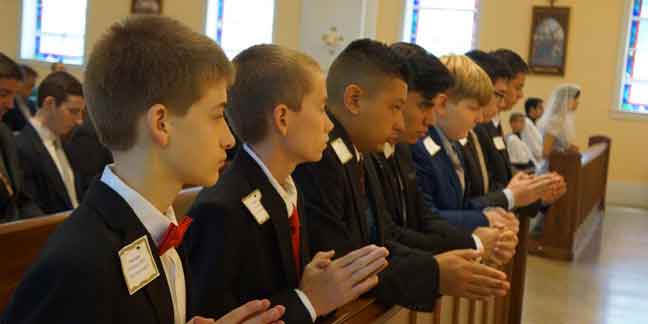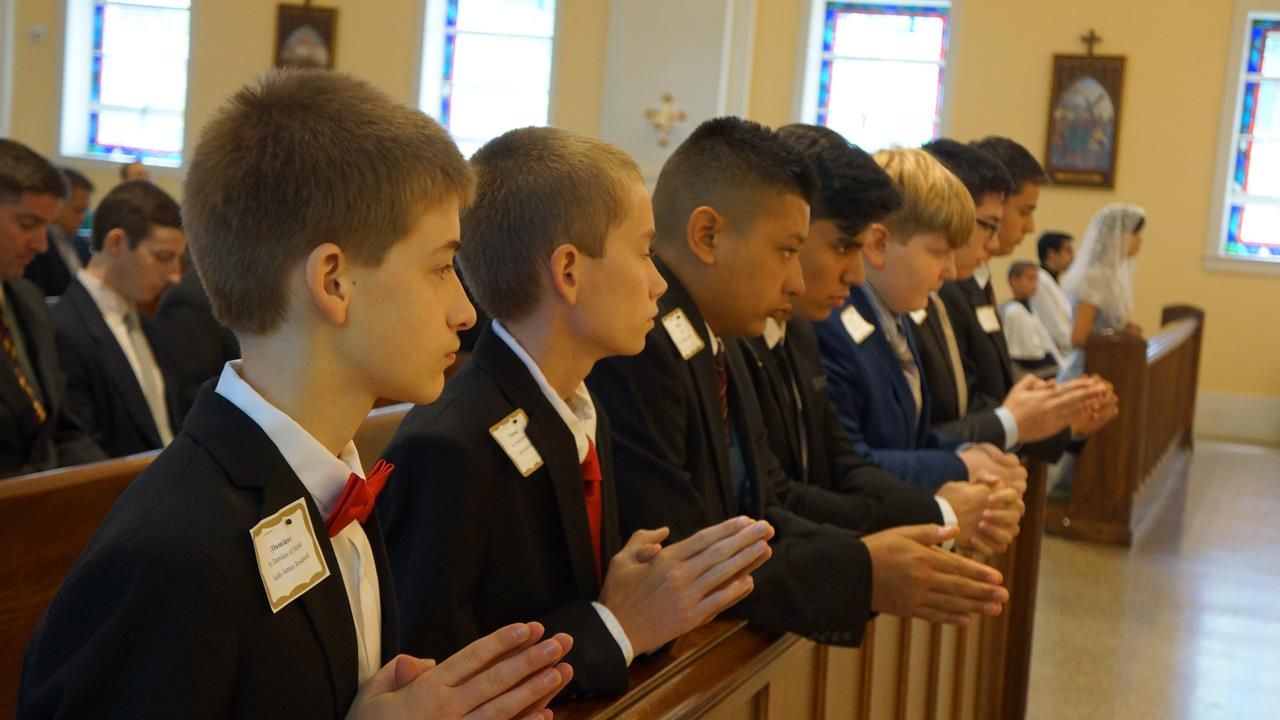 CHARLOTTE — Bishop Peter J. Jugis announces the following priest appointments:
CHARLOTTE — Bishop Peter J. Jugis announces the following priest appointments:
- Father Innocent C. Amasiorah: From ministry outside the diocese to Campus Ministry at the University of North Carolina at Charlotte, effective Aug. 15.
- Father Jason K. Barone: From parochial vicar at St. Patrick Cathedral in Charlotte to in-residence at St. Ann Church in Charlotte, while continuing as diocesan promoter of vocations and assistant chaplain at Charlotte Catholic High School, effective July 5.
- Father Paul M. Buchanan: After completing his studies for a Licentiate in Sacred Theology, to parochial vicar at Our Lady of Grace Church in Greensboro, effective Aug. 1.
- Vincentian Father John Carney: From ministry outside the diocese to parochial vicar at St. Mary Church in Greensboro, effective June 13.
- Father Noah C. Carter: From parochial vicar at Our Lady of Grace Church in Greensboro and chaplain of Bishop McGuiness High School in Kernersville to full-time studies for a Licentiate in Liturgical Theology in Rome, effective Aug. 10.
- Newly ordained Father A. Cory Catron: Parochial vicar at St. Mark Church in Huntersville, effective July 5.
- Father Julio C. Dominguez: From pastor at St. Francis of Assisi Church in Lenoir to Hispanic Ministry Coordinator for the Smoky Mountain Vicariate, effective Sept. 1.
- Vincentian Father Tri Duong: From parochial vicar at St. Mary Church in Greensboro to ministry outside the diocese, effective May 9.
- Father Stephen M. Hoyt: From parochial vicar at Holy Family Church in Clemmons to pastor at St. Francis of Assisi Church in Lenoir, effective Sept. 1.
- Vincentian Father Peter Hung Le: From ministry outside the diocese to parochial vicar at St. Mary Church in Greensboro, effective June 13.
- Father Joseph Matlak: Chaplain at Holy Trinity Middle School in Charlotte, effective Aug. 24. Father Matlak has also been assigned by the Ukrainian Catholic bishop of the Eparchy of Parma, Ohio, as full-time administrator of St. Basil the Great Ukrainian Catholic Mission in Charlotte and the new St. John the Baptist Ukrainian Catholic Mission in Pineville effective Sept. 1.
- Father Paul M. McNulty: Continuing as parochial vicar at St. Mark Church in Huntersville and the new chaplain of Christ the King High School in Huntersville, effective Aug. 24.
- Newly ordained Father David R. McCanless: From parochial vicar at St. Patrick Cathedral in Charlotte to full-time studies for a Licentiate in Biblical Theology in Rome, effective Sept. 1.
- Father Elie Mikhael: From parochial vicar at St. Matthew Church in Charlotte to ministry outside the diocese, effective Aug. 7.
- Father Felix F. Nkafu: From ministry outside the diocese to parochial vicar at St. Leo the Great Church in Winston-Salem, effective Sept. 1.
- Father Peter K. Nouck: From ministry outside the diocese to parochial vicar at Holy Family Church in Clemmons, effective Sept. 1.
- Father Basile N. Sede: From sacramental minister at St. Benedict the Moor Church in Winston-Salem and Good Shepherd Mission in King to pastor of St. Benedict the Moor Church and Good Shepherd Mission, effective Aug. 9.
- Vincentian Father Charles Strollo: From ministry outside the diocese to pastor at St. Mary Church in Greensboro, effective June 13.
- Father Richard F. Sutter: From ministry outside the diocese to parochial vicar at St. Patrick Cathedral in Charlotte, effective Aug. 17.
- Vincentian Father John Timlin: From pastor at St. Mary Church in Greensboro to ministry outside the diocese, effective June 13.
— Catholic News Herald

CHARLOTTE — Bishop Peter Jugis administered the sacrament of confirmation to eight young people during a Mass in the Extraordinary Form June 25 at St. Ann Church in Charlotte – a first for the 44-year-old Diocese of Charlotte.
St. Ann Church hosts the Charlotte Latin Mass Community, which supports and promotes awareness of the Traditional Latin Mass in the diocese.
The Solemn High Mass was offered by Father Jason Barone, parochial vicar of St. Patrick Cathedral in Charlotte, with Father Jason Christian of St. Thomas Aquinas Church serving as deacon and Deacon Matthew Bean serving as subdeacon.
Confirmandi were: Kyle James Derscheid, Daniel Dean Dierking, Benjamin Joseph Jakubek, Cristhian Rodriquez, Kevin Francisco Romero, Isaiah James Rosamond, Mary Imelda Ohlhaut and Sebastian Adriano.
During the rite of confirmation in the Extraordinary Form, which is celebrated according to the 1962 Missal, the candidates knelt before the bishop, who anointed their foreheads with sacred chrism, made the sign of the cross over them three times, and then lightly slapped them on the left cheek as he told them, "Pax tecum" ("Peace").
After they were anointed, Father Timothy Reid, pastor of St. Ann Church and spiritual advisor to the Charlotte Latin Mass Community, wiped their foreheads clean with a mixture of bread and lemons.
To learn more about the Latin Mass in the Charlotte diocese, go to www.charlottelatinmass.org or www.nctlmmef.com.











